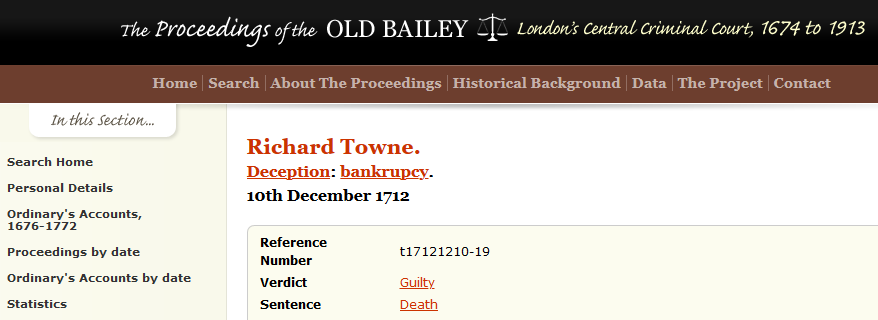
Published on 2 April 2020
We have done four previous blogs about the punishment of economic crime as recorded in the Old Bailey archives and particularly for the period when we have the “Ordinary’s Account” of the resulting executions.
Now we should move on to the cases of where a proprietor of a business conceals assets during the business’ liquidation or in the course of their personal bankruptcy…and does a runner, or indeed sets up a new business.
There have been numerous recent cases in the UK of creditors being left empty-handed whilst the directors and proprietors of the bankrupt business move on, to new businesses, new employers, or even to financial sector regulatory or authority bodies: this latter is amazing but true.
A tallow-chandler Richard Towne – in case t17121210-19 – was convicted of the crime of deception/bankruptcy on 10th December 1712 at the Bailey: he was duly sentenced to the high jump. The duty Ordinary Paul Lorrain, in his Account of executions on 23rd December 1712, goes on ad infinitum about the spiritual solace he offered to the nine condemned, and to the beleaguered Towne in particular.
Mr Towne was of sufficient means to be conveyed to the Tyburn in a coach, rather than on the back of a cart with the other eight. The comfort afforded by this must have swiftly turned to bile when Lorrain hitched a ride.
Towne offhandedly remarked that 23rd December was his birthday, and no-one likes being hung on their birthday, whereupon Lorrain “took occasion to mention this of Solomon to him, viz. That the Day of Death is better than the Day of one’s Birth; shewing him, That by our Birth we enter into a World of Sin and Misery, but by our Death are deliver’d out of it, and admitted (if well prepar’d) into a State of Bliss and Glory, that never shall end”.
What a bore! Towne seems to have been dogged by such ill fortune, because he had managed at first to liquidate all his assets into coin, and to embark upon a “Lacquer-Boat” bound for Holland. But he had poor sea legs and “being Sea-sick, and going to ease his Stomach over the side of the Ship, Eight hundred Guineas (which he had in two Bags in his Breast, between his Coat and Waistcoat) fell over Board”.
That’s unlucky. You dive for a chunder and drop £88,000 (in today’s money) into the North Sea. And then to get arrested, handed to the law and hung – a bad day out of the office.
By the way, the apparent derivation of “chunder” is “watch under”, the warning given by someone about to honk on higher decks of a ship to those on lower decks and unwisely protruding from portholes.
We have had a number of UK businesses – like Southern Healthcare and Carillion – that have gone under but where the directors and principals have proceeded to their next incarnation unaffected, in one case – shock horror – to become Master of a Cambridge college. Who says we have made progress in our law-making and deterrent punishment?
